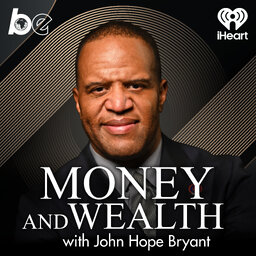The Life Lessons of Ambassador Andrew Young
This special episode features an interview with Ambassador Andrew Young.
Ambassador Andrew Young is a politician, diplomat, and activist. Beginning his career as a pastor, he was an early leader in the civil rights movement, serving as executive director of the Southern Christian Leadership Conference and a close confidant to Martin Luther King Jr.
In 1 playlist(s)
Money & Wealth With John Hope Bryant
John Hope Bryant- successful entrepreneur, executive and philanthropist –will dispense his trademark…Social links
Follow podcast
Recent clips

REPLAY: When Smart People Fail
1:06:23

Turning No Into a Lease
12:17

Built for the Storm: How to Protect, Survive & Thrive in Uncertain Times
54:29
 Money & Wealth With John Hope Bryant
Money & Wealth With John Hope Bryant